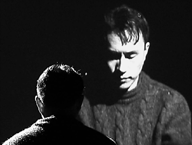Edit
 KOREA, USA / 2003 / Korean, English / Color / Video / 100 min
KOREA, USA / 2003 / Korean, English / Color / Video / 100 min
Director, Script, Photography, Editing, Sound, Narrator, Producer: Lee Chang-jae
Music: Rene Aubry
Source: Lee Chang-jae
1111 N. Dearborn #2109 Chicago, Illinois, 60610 USA
Phone: 1-312-933-1848
E-mail: dada717@hanmail.net
A former TV director suffers from insomnia, his conscience bothered by a program he made before. He filmed the present-day lives of university student activists from the 1980s who joined railway and factory workplaces, only to be forced by his superiors at the TV network to broadcast a censored version. While facing his personal history and his own indebtedness toward those who threw themselves wholeheartedly into the labor movement, he re-edits footage to show the activists’ humanity and convictions. An act of penance by the student movement generation.
[Director’s Statement] Editing is a willful distortion of facts. People edit their memories continuously according to their desires. Hence, a man’s present is a collective of edited memories.
The film contrasts college-degreed workers and the director by showing their lives and ideologies. The style of filmmaking in each sequence is very different and presents cacophonous relationships between different points of view.
The film documents several third world intellectuals who willingly join the working class and as a result are stripped of some of their fundamental rights. The film expresses their severe but vivid lives in the style of media direct broadcasting. Through their lives, the film questions justice and the obligations of intellectuals.
And this film is also a self-documentary seeking personal truths. The maker’s objectivity is achieved through the use of false images like the reflected image, screened image, and shadow. By the false images, the director self-reflects himself and says “This is a false life like a shadow. . .”
The film asks what editing is and what the truth of documentaries and personal memories are by shifting through various filmic, temporal, and personal layers.
 Lee Chang-jae
Lee Chang-jaeAfter graduating from university (law major), joined Samsung Entertainment Group and from 1995 worked as documentary director for Q Channel, a documentary broadcast company associated with the Discovery Channel and the BBC. Applied cinema verité-based video journalism to TV documentaries, in contrast to the re-enactments commonly used in Korean documentaries. Resulted in launching the news magazine Asia Report, which got a huge response from viewers. Became a chief producer of Asia Report, and received the Best Documentary Program award from the Korea Broadcasting Committee in May 1999 for Free Zone of Prisoners—Sablayan Prisons in the Philippines. Served as professional course chair for video journalists at the Joongang Daily News Educational Center for two years and an instructor of the Korea Broadcasting Development Association for current working professionals until 2001. Has studied film in the M.F.A. program at the School of the Art Institute of Chicago since 2001. Currently exploring independent film. |
|
• New Asian Currents | Sand and Water | Wellspring | Three-Five People | Homesick | The Circle’s Corner | The Maze of Lanes | Nee Engey—Where Are You | NEW (IMPROVED) DELHI—Director’s Cut | A Night of Prophecy | 150 Seconds Ago | The Ballad of Life | Noah’s Ark | The Old Man of Hara | Dandelion | Hibakusha—At the End of the World | 3rd Vol.2—2 Light House | And Thereafter | Dust Buries Sabuk | Family Project: House of a Father | Edit | Gina Kim’s Video Diary | Ordo | Her and Him Van Leo | The Big Durian | Perpetual Motion | Debris | Hard Good Life | Nail | The Rhythm in Wulu Village | A Short Journey • Jurors | Kim Dong-won | Kawase Naomi • New Asian Currents Special | Part 1 | Part 2 |
